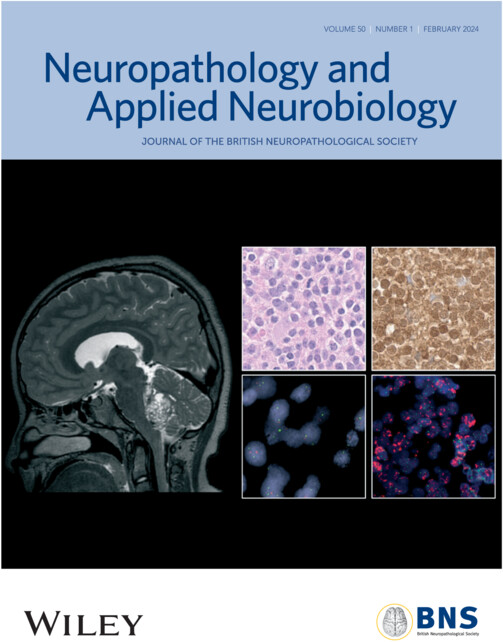勘误表。
IF 4
2区 医学
Q1 CLINICAL NEUROLOGY
引用次数: 0
摘要
本文章由计算机程序翻译,如有差异,请以英文原文为准。
Erratum.
FIGURE 5. Axonal (Wallerian) degeneration in adult human sural nerve. (Wallerian) degeneration in adult human sural nerve. Loss of neurofilament staining of larger axons is apparent within areas of myelin basic protein (MBP)-stained myelin. (A) Toluidine blue-stained plastic sections show myelin ovoids and irregularly shaped myelin sheaths. Scattered Schwann cells associated with myelin and other endoneurial cells contain lipid debris or droplets. Bar = 10 μM. (B) Neurofilament-stained frozen sections show round pale regions (arrow at the top right of image) that likely represent the loss of larger axons within areas of residual myelin. Smaller axons are relatively preserved. Bar = 20 μM. (C) Ultrastructural analysis shows a damaged axon (left) with irregular cytoplasm inside thick myelin associated with surrounding Schwann cell cytoplasm containing myelin debris and lipid droplets (arrow left). An endoneurial macrophage (right) (not likely a Schwann cell as it has no surrounding basal lamina) contains myelin debris and lipid droplets (arrow right). Bars = 2 μM. (D) Acid phosphatase (AcP) stains scattered endoneurial histiocytes (red). Bar = 50 μM. (E) Neural cell adhesion molecule (NCAM) (green) stains non-myelinating Schwann cells (see I). P0 protein (P0) (red) stains myelin sheaths (see H). There is minimal overlap (yellow). (F) NCAM and MBP show overlap (yellow) on both NCAM cells and some MBP-containing myelin. (G) Many MBP myelin regions have central regions with no neurofilament-stained axons (arrow). (H) Scattered P0 regions have central regions with no neurofilament-stained axons (arrow). (I) Most NCAM (red) regions have associated co-stained axons (yellow) suggesting acute axon loss is less prominent among small-sized axons. Bars for E–I = 100 μM. DOI: 10.1111/nan.12906
求助全文
通过发布文献求助,成功后即可免费获取论文全文。
去求助
来源期刊
CiteScore
8.20
自引率
2.00%
发文量
87
审稿时长
6-12 weeks
期刊介绍:
Neuropathology and Applied Neurobiology is an international journal for the publication of original papers, both clinical and experimental, on problems and pathological processes in neuropathology and muscle disease. Established in 1974, this reputable and well respected journal is an international journal sponsored by the British Neuropathological Society, one of the world leading societies for Neuropathology, pioneering research and scientific endeavour with a global membership base. Additionally members of the British Neuropathological Society get 50% off the cost of print colour on acceptance of their article.

 求助内容:
求助内容: 应助结果提醒方式:
应助结果提醒方式:


